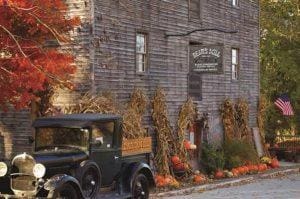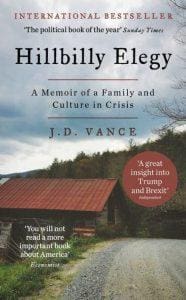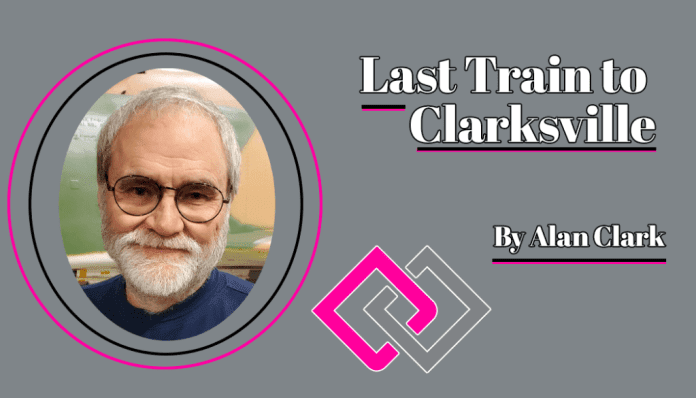I want to talk with you today about large families growing up in small towns like Greenville.
My dad was a mistake. His poor mom was forty-five when he was born. He was the youngest of eleven kids. As the story is told, when dad’s mom found out she was pregnant with dad, she went outside, sat down on a rock, and cried unconsolably.
 Dad grew up in a twelve hundred sq. ft. house across the road from Bear’s Mill. Dad’s folks were farmers who grew all of their own food and traded some of it to Bear’s Mill in exchange for ground flower.
Dad grew up in a twelve hundred sq. ft. house across the road from Bear’s Mill. Dad’s folks were farmers who grew all of their own food and traded some of it to Bear’s Mill in exchange for ground flower.
The greatest number of kids who lived at home during the same time was eight. All of the girls slept in one room, the boys another. Dormitory sleeping style was the order of the day.
Dad’s father died when he was twelve. His sisters were all married, and most of his brothers were in the military. His mom could not manage the farm alone, so dad and his mom were evicted and were forced to move to town and live in a small apartment on Euclid Ave (next to the old Jr. High building) owned by my aunt, Ruth.
My grandma performed odd jobs to keep them afloat and dad at age thirteen got a job also. They were both very poor but managed to get by somehow.
Let’s fast forward about twenty years or so to my youth. I grew up with aunts and uncles everywhere. And most of them had lots of kids so I inherited tons of cousins. There were so many of us Clarks in Greenville at the time, that on special holidays like Thanksgiving, the extended family would rent the EUB church auditorium.
Several members of my extended family attended The Evangelical United Brethren church so we would rent their giant meeting hall. I barely even knew half of my cousins because there were so many of them.
My dad’s family of eleven brothers and sisters had their issues, but they were tribal in many respects in that they were there for one another, when needed. They bickered and argued and gossiped about each other, but when one of them got knocked down, for whatever reason, the family pulled together as best they could to help the injured sibling.
Having great friends in life is a sweet addition to our journey here on Earth but family is different. There is something special and bonding going on amongst people sharing the same DNA. When it comes to blood relations, we are oft times moved to act, even against our own self-interest, in order to help a wounded brother or sister. This does not happen as often these days, because large extended families scatter to the four corners of America, following their career paths, etc., but in days past, this was not the norm, and I got to witness extended family closeness up close.
The period of large families living in close proximity to one another has passed, and I am thus exceedingly thankful that I got to grow up in a Norman Rockwell painting – called Greenville, Ohio, flush with relatives and built in playmates. Some of my cousins were my best buds.
 In a postscript to the above, let me briefly discuss a book titled Hillbilly Elegy: A Memoir of a Family and Culture in Crisis by J. D. Vance about the Appalachian values of his Kentucky family. Regardless of what one thinks of Vance’s political values, his book describes my family’s background. Both of my parents were basically hillbillies. For example, dad grew up without indoor running water or plumbing; they had a spring in the basement that met their drinking and cooking water needs and they used an outhouse for their black water requirements. Dad also grew up, initially without electricity.
In a postscript to the above, let me briefly discuss a book titled Hillbilly Elegy: A Memoir of a Family and Culture in Crisis by J. D. Vance about the Appalachian values of his Kentucky family. Regardless of what one thinks of Vance’s political values, his book describes my family’s background. Both of my parents were basically hillbillies. For example, dad grew up without indoor running water or plumbing; they had a spring in the basement that met their drinking and cooking water needs and they used an outhouse for their black water requirements. Dad also grew up, initially without electricity.
Both of my parents grew up dirt poor, but they managed to achieve a middle-class lifestyle, complete with summer vacations, great presents on special occasions and holidays, good food, nice clothes and more, plus they owned their own home. I thus grew up not really knowing how poor they both were in their youth.
To drag a football analogy into the picture, my parents advanced the ball from let’s say the ten-yard line to the forty before handing off the ball to me and my sister, Elaine. We thus started our life’s journey further down the field than our parents. We, therefore, were able to advance the ball even further before handing it off to our kids.
That’s how it used to work in our country. Unfortunately, my kids (gen X-ers) were probably the last generation to have the opportunity to achieve a more “successful” (with regards to achieving the American Dream) life than did the baby boomers before them.
Until we meet again…






